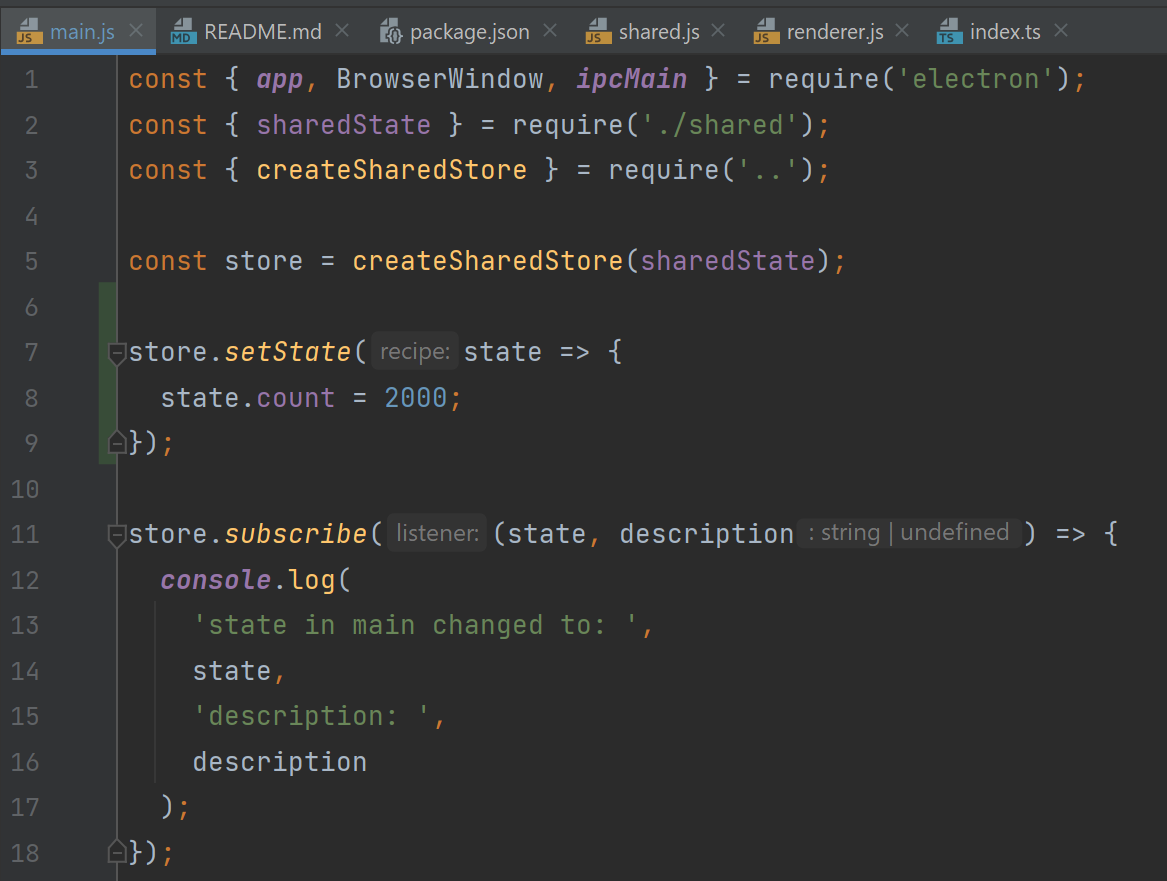Sharing state between main and renderer process can be this easy.
- 🚀 Mutate your state while keep them in sync with other process
- 🎯 Write in typescript with full typing support
- ❤️ Elegant and easy to learn API
- 👻 Immutability and structural sharing out of the box with built-in immer
npm install electron-shared-stateor
yarn add electron-shared-stateYou can check source code under example directory.
// shared
export const initialState = 0;
// renderer
import { createSharedStore } from 'electron-shared-state';
const sharedStore = createSharedStore(initialState);
sharedStore.subscribe((state) => {
console.log(state);
});
setTimeout(() => {
sharedStore.setState((state) => {
state = state + 1;
});
}, 2000);
// main
import { createSharedStore } from 'electron-shared-state';
const sharedStore = createSharedStore(initialState);
sharedStore.subscribe((state) => {
console.log(state);
});
// both main and renderer will print the state after two seconds.If your project already using state management tools like redux, you can easily replace a slice of your state with electron-shared-state, so you can just share part of the state you want to share without create a whole state tree in both processes.
// renderer
const sharedStore = createSharedStore(initialState);
// split state into a reducer
function sharedReducer(state, action) {
switch (action.type) {
case 'some action type':
const nextState = sharedStore.setState(...);
return nextState;
}
}
// combine with other reducer
const rootReducer = combindReducers({
other: ...,
shared: sharedReducer,
...
});
// create redux store
const store = createStore(rootReducer)
// in main process
// only this part of state will be shared across main and renderer
export const store = createSharedStore(initialState);electron-shared-state only provides one simple function: createSharedStore. The signature is like below:
interface Options {
name?: string;
}
function createSharedStore<T>(
state: T,
options?: Options
): {
setState: (recipe: (draft: T) => void, description?: string | undefined) => T;
getState: () => T;
subscribe: (
listener: (state: T, description?: string | undefined) => void
) => () => void;
};The input is the state your want to share across processes, generally it's an object.
It also accepts an optional Option object, you can pass a store name if you want to have multiple stores.
const s1 = createSharedStore(..., { name: 's1' })
const s2 = createSharedStore(..., { name: 's2' })It returns a Store object with a few methods on it.
setState(stateUpdater, description)
Accepts a stateUpdater function and a description string for debug purpose. The stateUpdater is like the second argument of immer's produce, so it inherits immer's pitfalls.
Returns the new state. It use immer underneath so the state remains immutable, to keep it in sync across processes, you should always use setState to update it.
getState()
Returns the current state.
subscribe(listener)
Adds a change listener. It will be called any time the state is changed, the listener receives the latest state and a description string as arguments.





